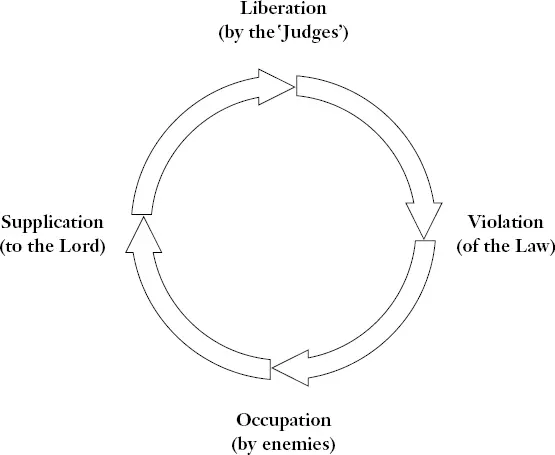God sent Israel into the land to destroy the inhabitants totally. Archaeology confirms the wicked practices of the Canaanite people – sexual diseases were rife. Those who question the justice of this extermination forget God’s Word to Abraham about the future of his descendants. He was told that the Jews would stay in Egypt for centuries until the wickedness of the Amorites reached its ‘full measure’. God was tolerant of their wickedness, but they finally overstepped the mark and he used Israel as the instrument of his judgement on a most perverted society.
Instead of following God’s commands, however, Israel were selective in their punishment. They captured the hills and mountains but allowed many of the peoples to remain, especially those living in the valleys. Israel thus became divided into three groups: northern, central and southern. Communication between the tribes was difficult and they were unable to respond speedily and unitedly when external threats arose. Furthermore, the valleys provided routes for invaders, who were only too keen to exploit such internal weakness.
(II) ALLIANCES – MIXED MARRIAGES
The lax standards of the valleys were too great a temptation for many Israelite men, and before long Israelites had married outside their faith in clear defiance of God’s law which forbade ‘mixed marriages’. This affected the spiritual life of Israel. If you marry a child of the devil you are bound to have problems with your father-in-law! Any designs on holy living were dashed and many Israelites in unequal marriages ended up serving Canaanite gods. The spiritual influence of the non-believer tends to be stronger in a mixed marriage, even today. The service of Canaanite gods led inevitably to immorality, for wrong belief always leads to wrong behaviour.
2. Incorrigible conduct
The bulk of the book of Judges consists of a series of cycles. With almost monotonous regularity the people of God repeat the same pattern.

 Supplication: It starts with Israel crying out to the Lord because they are facing oppression of some kind.
Supplication: It starts with Israel crying out to the Lord because they are facing oppression of some kind.
 Liberation: God sends a deliverer (e.g. Gideon, Samson) to rescue the people.
Liberation: God sends a deliverer (e.g. Gideon, Samson) to rescue the people.
 Violation: In spite of their deliverance, the people slip back into sin.
Violation: In spite of their deliverance, the people slip back into sin.
 Occupation: God therefore sends a hostile people (e.g. Midianites, Philistines) to overpower Israel. Israel becomes a vassal state in a land they should have been freely owning.
Occupation: God therefore sends a hostile people (e.g. Midianites, Philistines) to overpower Israel. Israel becomes a vassal state in a land they should have been freely owning.
 Supplication: In view of the hardship of the situation, they cry out to the Lord again and so the cycle continues. It seems they only pray when they are in trouble. It is hard to tell whether they are truly repentant or merely regretting the consequences of their behaviour. Clearly many were unaware that the oppression was their fault.
Supplication: In view of the hardship of the situation, they cry out to the Lord again and so the cycle continues. It seems they only pray when they are in trouble. It is hard to tell whether they are truly repentant or merely regretting the consequences of their behaviour. Clearly many were unaware that the oppression was their fault.
The cycle does not just apply to the whole nation: individuals also live in a similar routine of sin and forgiveness and further sin. It is not simply an endless cycle either, but a spiral going downwards. Things get steadily worse.
3. Inevitable corruption
The last part of the book of Judges is a most unedifying account of what happened to the people. There were two situations, one in the north in the territory of Dan and one in the south in the territory of Benjamin. On both occasions, the people of God were misled by a priest. It is a perfect illustration of the maxim mentioned earlier, that idolatry (wrong belief) leads to immorality (wrong behaviour).
(I) IDOLATRY IN THE NORTH – DAN
The story starts with a son, Micah from Ephraim, stealing 1,100 shekels from his own mother. He returns the money to her and she is so delighted that she uses it to make an idol which she gives to Micah for the private shrine he has set up in his home.
A young Levite comes to Micah’s house in search of lodgings and is offered the opportunity to be his father and priest for a regular income, clothing and food. He accepts. Later the tribes of Dan, who failed to take the land God allocated to them in the south, migrate north. When their leaders lodge in this house with the idols and the priest, they offer the priest the chance to officiate for their whole tribe, for more money, and he accepts.
In clear violation of the law of God, therefore, the tribe of Dan slips into idolatry. Just as Judas Iscariot, one of the 12 disciples, went missing after his great sin, the tribe of Dan is missing in the book of Revelation. The sin starts with a man who steals money from his mother, then it is carried over to a Levite who becomes a private chaplain, first to a family and then to a whole tribe – without any proper appointment or authorisation.
(II) IMMORALITY IN THE SOUTH – BENJAMIN
This story is even worse. Another Levite from the tribe of Ephraim takes a concubine from Bethlehem in Judah. She leaves him and returns to her family home. After four months the Levite arrives in Bethlehem to seek her return. The father keeps urging the Levite to stay at his home before finally letting her go. They set off too late in the day and only get as far as Jerusalem, a pagan city at that time. The Levite refuses to stay with ‘pagans’, so they travel north to the tribe of Benjamin, arriving at Gibeah by nightfall. They are offered hospitality by an old man who welcomes them into his home. However, while they are eating, they are interrupted by ‘wicked men of the city’ who demand that the newcomer be given to them for sex. The old man refuses, but offers instead his daughter. Eventually the Levite gives them his concubine. The next morning the concubine lies dead on the doorstep, having been gang-raped through the night.
The Levite cuts his concubine up into 12 pieces and sends them to the other tribes of Israel. When the Israelites discover that men of the tribe of Benjamin committed the crime, they seek revenge on the perpetrators. The Benjaminites are offended by the accusation and refuse to hand the men over.
A civil war results which almost wipes out the tribe – only 600 men are left. Their towns are destroyed and all the women and children are slaughtered. The other tribes had vowed not to give their daughters in marriage to the tribe of Benjamin, but now the tribe is on the brink of extinction and the Israelites have pity on them and take action to prevent this happening. They find 400 virgins from Jabesh Gilead as wives for the Benjaminites, but they need more. They then concoct a clever plan. They hold a festival at Shiloh and allow the Benjaminites to kidnap their daughters – thus not technically ‘giving’ them away and so fulfilling the letter if not the spirit of their previous oath.
It is a dreadful tale in all aspects and, alongside the story of the tribe of Dan, it makes a depressing end to the book of Judges.
Theological or eternal purpose
After such a gloomy story we turn to a more uplifting subject: a consideration of the theological purpose of the book. Ultimately Bible history is not a human record but a record of what God has said and done, showing us who he is.
Читать дальше


 Supplication: It starts with Israel crying out to the Lord because they are facing oppression of some kind.
Supplication: It starts with Israel crying out to the Lord because they are facing oppression of some kind.









